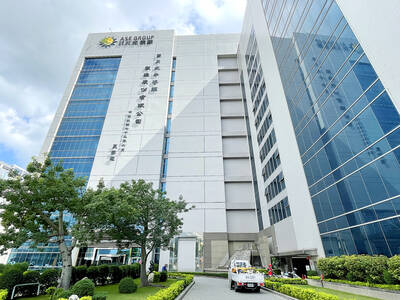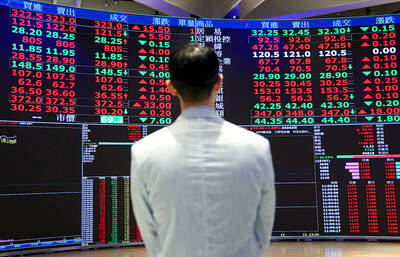EVA Airways Corp (EVA, 長榮航空), the nation’s second-largest carrier, plunged to a five-year low in Taipei trading after offering to sell new shares valued at about NT$4.86 billion (US$160 million) to fund aircraft purchases.
The airline fell by the 7 percent daily limit to NT$9.72, the lowest since May 22, 2003. The company will sell 500 million new shares, it said yesterday. The potential value of the sale was calculated based on yesterday’s closing price.
EVA and larger rival China Airlines Ltd (中華航空) have both dropped more than 30 percent in the past month as they cut services to offset jet-fuel prices that have almost doubled in a year. Both carriers also posted wider than expected losses in the first quarter.
The share sale plan is like “an emergency rights issue to cover huge losses,” Paul Dewberry, a Merrill Lynch & Co analyst, said in a report yesterday. EVA Airways “remains in difficulty and we should continue to short the stock.”
EVA acting spokeswoman Katherine Ko (柯文玲) denied that share sale was an emergency measure.
“The company has planned this rights issue for a long time,” she said. It “doesn’t have anything to do with the losses” in the first quarter.
The airline, based in Taoyuan County, posted a NT$2.29 billion loss in the period.
The new shares will help pay for three Boeing Co 777-300ERs due to be delivered by the end of 2010, Ko said.
The share sale is expected to be completed in November or December, she said.
TRANSASIA
Domestic transporter TransAsia Airways Corp (復興航空) confirmed yesterday it was abandoning its Taipei-Kaohsiung and Taipei-Tainan flight routes because of sluggish business.
The decision would be effective Aug. 1, TransAsia spokeswoman Janet So (湛華生) said yesterday during a telephone interview.
TransAsia Airways had to redirect its resources to fly more profitable routes such as cross-strait charter flights, she said.
The carrier’s decision to discontinue the north-south services came amid increasing pressure on domestic carriers from rising fuel costs and competition with the high-speed rail.
The move means that starting next month, there will no longer be flights from Taipei’s Songshan Airport to Kaohsiung and Tainan.
High-speed rail tickets from Taipei to Kaohsiung are NT$1,190 on weekdays and NT$1,490 on weekends and holidays.

EXPANSION: The investment came as ASE in July told investors it would accelerate capacity growth to mitigate supply issues, and would boost spending by 16 percent ASE Technology Holding Co (ASE, 日月光投控), the world’s biggest chip assembly and testing service provider, yesterday said it is investing NT$17.6 billion (US$578.6 million) to build a new advanced chip packaging facility in Kaohsiung to cope with fast-growing demand from artificial intelligence (AI), high-performance-computing (HPC) and automotive applications. The new fab, called K18B, is to commence operation in the first quarter of 2028, offering chip-on-wafer-on-substrate (CoWoS) chip packaging and final testing services, ASE said in a statement. The fab is to create 2,000 new jobs upon its completion, ASE said. A wide spectrum of system-level chip packaging technologies would be available at

Taiwan’s foreign exchange reserves hit a record high at the end of last month, surpassing the US$600 billion mark for the first time, the central bank said yesterday. Last month, the country’s foreign exchange reserves rose US$5.51 billion from a month earlier to reach US$602.94 billion due to an increase in returns from the central bank’s portfolio management, the movement of other foreign currencies in the portfolio against the US dollar and the bank’s efforts to smooth the volatility of the New Taiwan dollar. Department of Foreign Exchange Director-General Eugene Tsai (蔡炯民)said a rate cut cycle launched by the US Federal Reserve

HEAVYWEIGHT: The TAIEX ended up 382.67 points, with about 280 of those points contributed by TSMC shares alone, which rose 2.56 percent to close at NT$1,400 Shares in Taiwan broke records at the end of yesterday’s session after contract chipmaker Taiwan Semiconductor Manufacturing Co (TSMC, 台積電) hit a fresh closing-high amid enthusiasm toward artificial intelligence (AI) development, dealers said. The TAIEX ended up 382.67 points, or 1.45 percent, at the day’s high of 26,761.06. Turnover totaled NT$463.09 billion (US$15.22 billion). “The local main board has repeatedly hit new closing highs in the past few sessions as investors continued to embrace high hopes about AI applications, taking cues from a strong showing in shares of US-based AI chip designer Nvidia Corp,” Hua Nan Securities Co (華南永昌證券) analyst Kevin Su

Nvidia Corp’s major server production partner Hon Hai Precision Industry Co (鴻海精密) reported 10.99 percent year-on-year growth in quarterly sales, signaling healthy demand for artificial intelligence (AI) infrastructure. Revenue totaled NT$2.06 trillion (US$67.72 billion) in the last quarter, in line with analysts’ projections, a company statement said. On a quarterly basis, revenue was up 14.47 percent. Hon Hai’s businesses cover four primary product segments: cloud and networking, smart consumer electronics, computing, and components and other products. Last quarter, “cloud and networking products delivered strong growth, components and other products demonstrated significant growth, while smart consumer electronics and computing products slightly declined,” compared with the